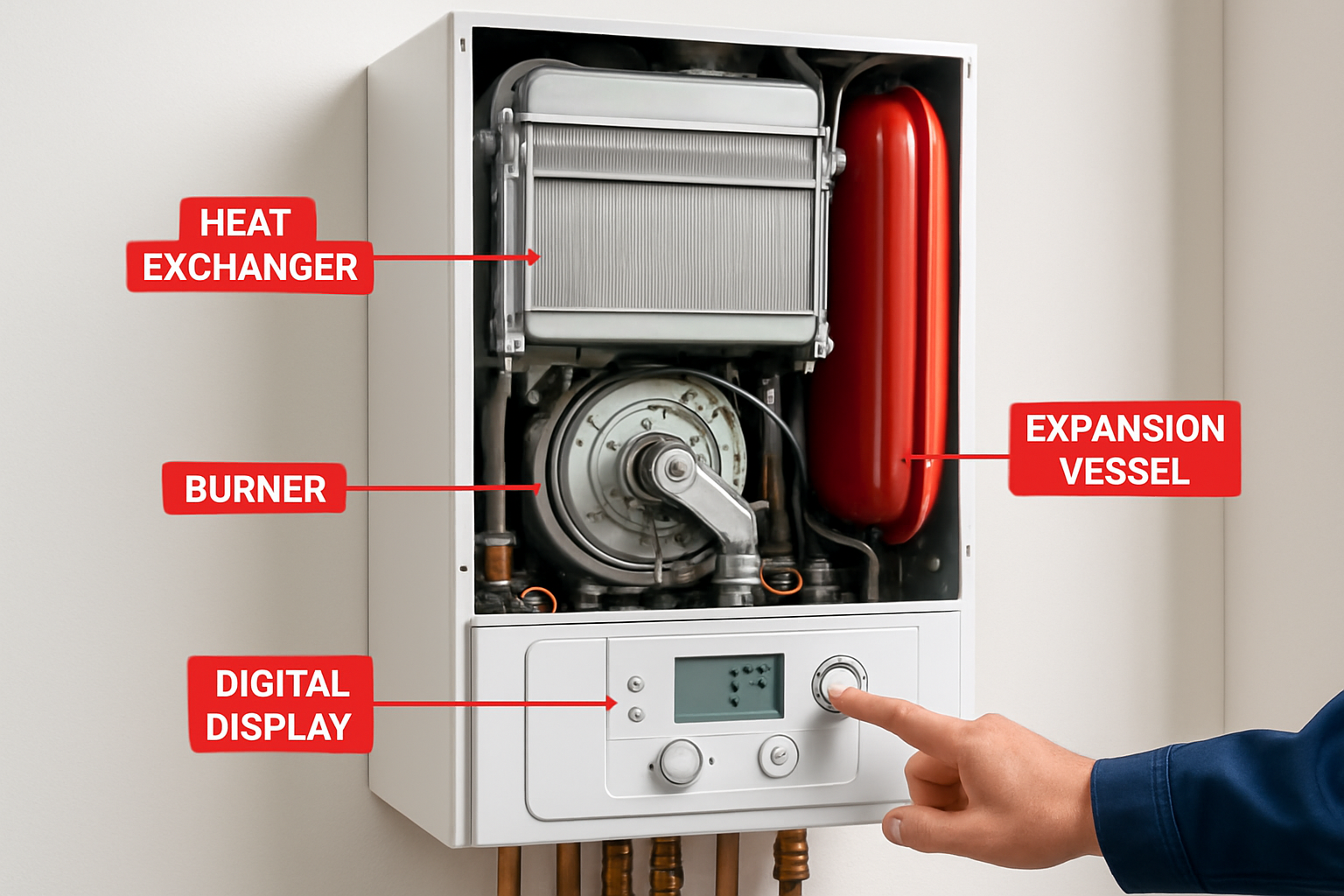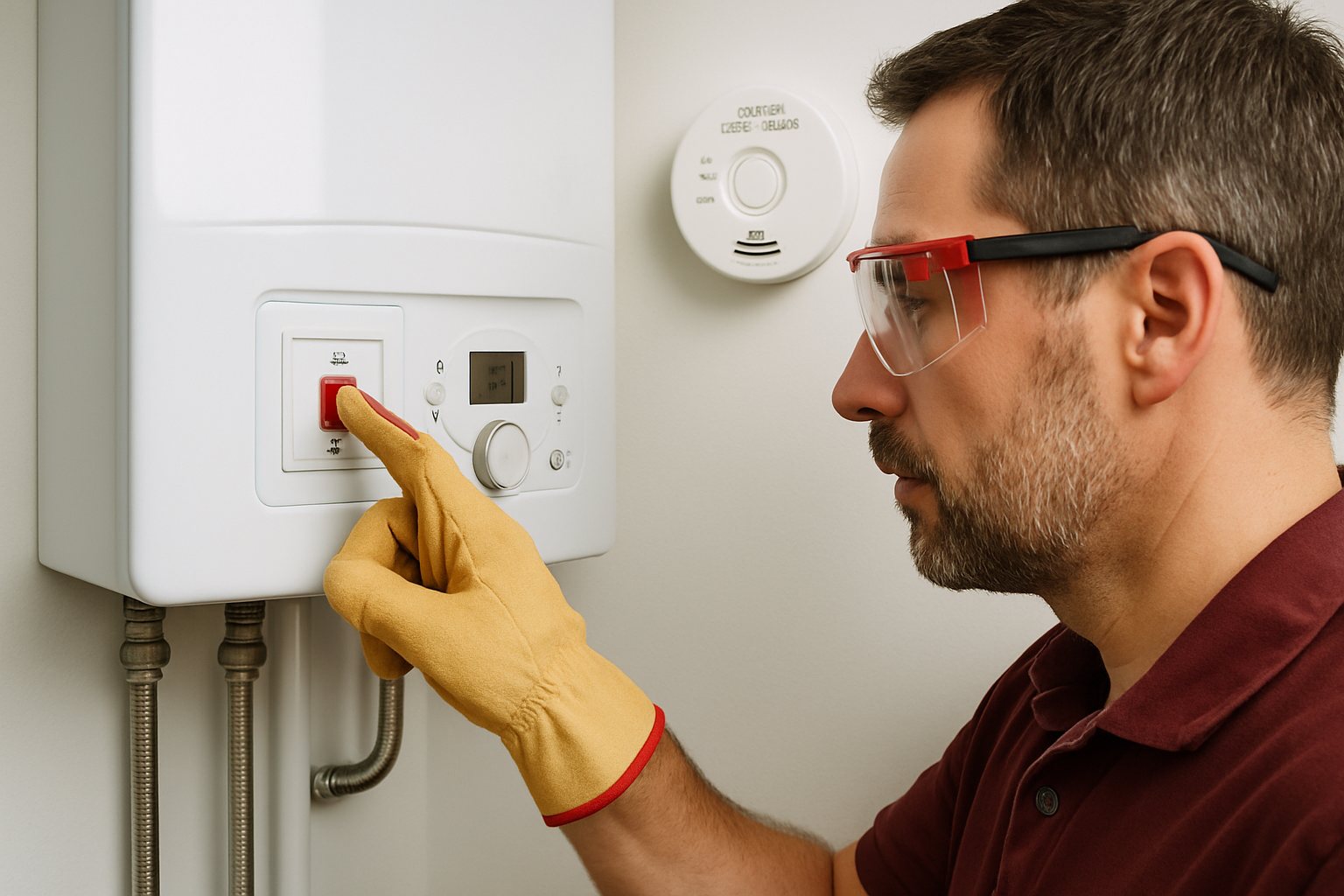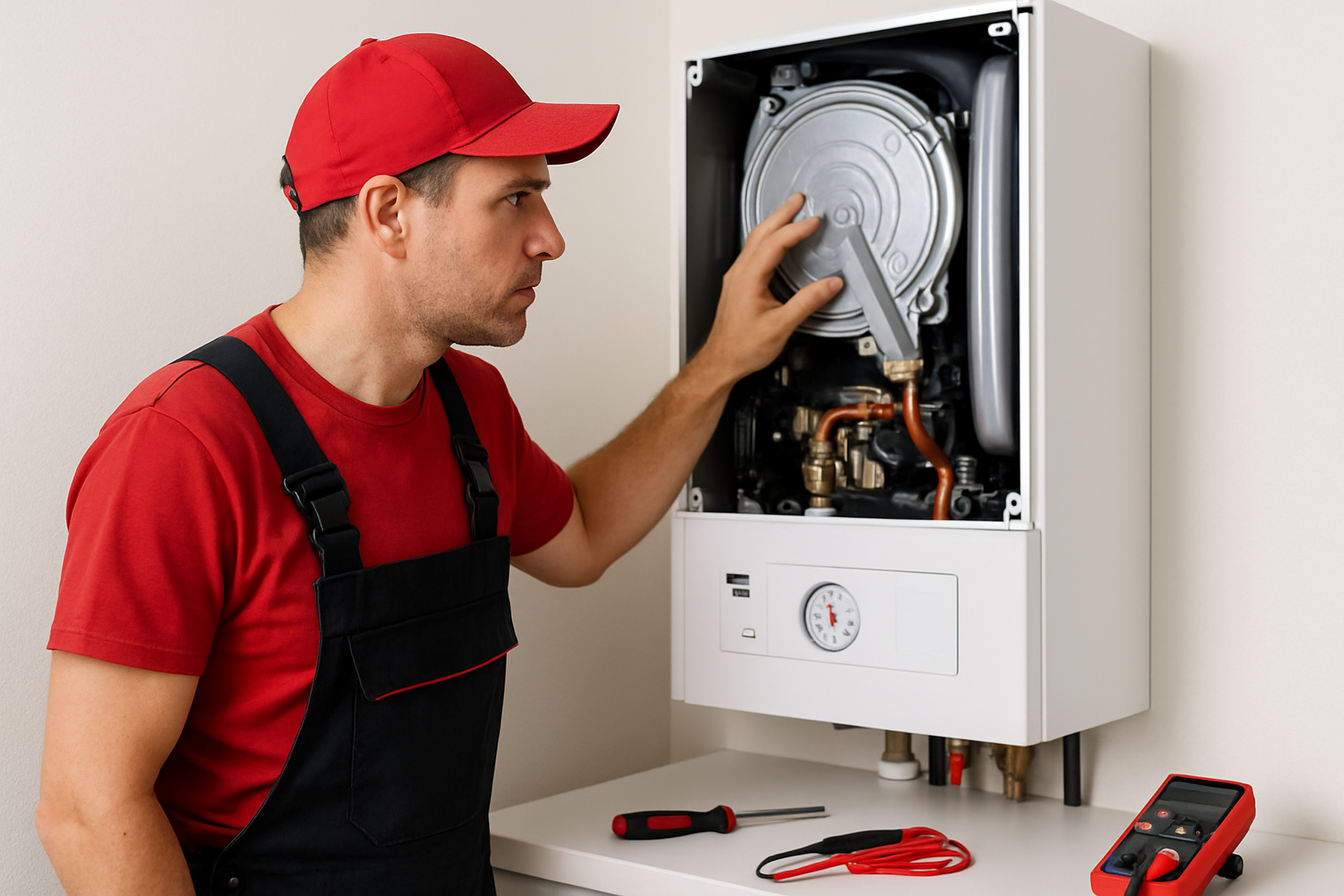Repair Gas Boiler Guide: Essential Steps for 2025
As energy bills climb and new efficiency standards arrive in 2025, having a dependable gas boiler is more crucial than ever. The last thing any homeowner or property manager wants is to face a sudden breakdown in the middle of winter.
This guide is your complete resource to repair gas boiler issues safely and effectively, helping you avoid costly emergencies and stress. We’ll walk you through troubleshooting, diagnosis, safety steps, common faults, hands-on repair instructions, when to call in a professional, and smart maintenance tips.
Don’t let rising costs or unexpected failures catch you off guard. Follow this step-by-step guide to keep your boiler running smoothly, save money, and ensure your home remains warm and safe all year round.
Understanding Your Gas Boiler: Types, Components, and Common Problems
A thorough understanding of your gas boiler is the foundation for any successful effort to repair gas boiler issues. Whether you’re a homeowner or property manager, knowing what’s inside your boiler and how it works helps you identify problems faster and make smarter decisions about repairs.

Types of Gas Boilers
There are three main types of gas boilers found in UK homes:
- Combi Boilers: Provide instant hot water and heating, no separate tank needed.
- System Boilers: Use a hot water cylinder, ideal for homes with high hot water demand.
- Conventional Boilers: Require both a cylinder and a cold water tank, common in older properties.
Choosing the right type is crucial when you want to repair gas boiler systems, as each design has different troubleshooting steps and parts.
Quick Comparison Table
| Boiler Type | Hot Water Supply | Storage Needed | Best For |
|---|---|---|---|
| Combi | Instant | None | Flats, small homes |
| System | Stored | Cylinder | Larger households |
| Conventional | Stored | Tank & Cylinder | Older homes, low water pressure |
Key Boiler Components
Understanding what’s inside your boiler makes it easier to repair gas boiler faults and communicate with engineers. The most important components include:
- Heat Exchanger: Transfers heat from gas to water.
- Burner: Ignites the gas fuel.
- Thermostat: Controls temperature.
- Pressure Relief Valve: Prevents dangerous pressure build-up.
- Expansion Vessel: Manages pressure changes.
- Pump: Circulates heated water.
- Digital Controls/Display: Shows error codes and settings.
If you’re troubleshooting, always check these components first.
Modern Boilers vs. Older Models
Modern gas boilers in 2025 look and operate differently from older units. Today’s models feature:
- Digital Controls: Easy-to-read displays and smart thermostats.
- Improved Efficiency: Condensing technology saves energy.
- Better Safety Standards: Enhanced sensors and automatic shut-offs.
Older boilers are more likely to have manual dials and fewer safety features. When you repair gas boiler models from previous decades, sourcing parts and interpreting error codes can be trickier.
Common Gas Boiler Problems in 2025
Despite new technology, issues still arise. Some of the most frequent problems this year include:
- Ignition Failures: Boiler won’t start or keeps shutting off.
- Pressure Drops: Can trigger error codes like E119 on combi boilers.
- Leaks: From pipes, valves, or the boiler casing.
- Strange Noises: Kettling, banging, or gurgling sounds.
- Error Codes: Digital displays showing specific faults.
Did you know over 60% of UK homes rely on gas boilers for heating and hot water? With so many in use, it’s no surprise these issues are common. For deeper insights, you can check out this guide to common gas boiler problems.
Why Boiler Model and Age Matter
Before you attempt to repair gas boiler issues, always check the make, model, and age of your unit. Manuals and online resources are often model-specific. Older units may need discontinued parts, while newer ones might require specialist knowledge.
Regular servicing and routine checks dramatically reduce the risk of major faults. Many common problems are preventable with annual maintenance, so don’t skip that yearly appointment.
Safety First: Precautions Before Attempting Boiler Repairs
Before you attempt to repair gas boiler issues, safety must always come first. Gas appliances can be dangerous if mishandled, and understanding the risks and requirements is crucial for every homeowner or property manager.

Gas Safety and Legal Requirements
When you repair gas boiler systems, you’re dealing with potentially hazardous gas and carbon monoxide. Even a small leak can put lives at risk. That’s why UK law states only Gas Safe registered engineers can legally repair gas boiler appliances. Unqualified attempts can lead to heavy fines, invalidated insurance, and, more importantly, serious accidents. For a full overview of your legal obligations and why these rules exist, review the Gas Safety (Installation and Use) Regulations 1998. Always check credentials before allowing anyone to work on your boiler.
Essential Tools and Protective Gear
Before you repair gas boiler faults, make sure you have the right equipment. Essential tools include:
- Screwdrivers (various sizes)
- Multimeter for electrical checks
- Pressure gauge
- Gas leak detector
Personal protective gear is just as important:
- Insulated gloves
- Safety goggles
- Carbon monoxide alarm nearby
Having these on hand helps you work safely and spot hazards early, ensuring every repair gas boiler task stays under control.
Shutting Down and Isolating the Boiler
Never start to repair gas boiler components without fully shutting down the system. Here’s how:
- Turn off the power at the main switch.
- Close the gas supply valve.
- Shut off the water feed to the boiler.
Wait for the system to cool completely before opening any access panels. This not only protects you from burns but also prevents further damage to internal parts. Following these steps is a non-negotiable part of every safe repair gas boiler procedure.
When Not to DIY: Recognizing Red Flags
It’s vital to recognize when a repair gas boiler job is beyond DIY. Call a professional immediately if you notice:
| Red Flag | Action Needed |
|---|---|
| Strong gas smell | Evacuate & call emergency services |
| Visible flames | Turn off gas, call an engineer |
| Persistent leaks | Stop water, consult a pro |
Over 30% of UK boiler accidents result from unqualified DIY attempts. Don’t risk your safety—when in doubt, always call an expert.
Step-by-Step Gas Boiler Diagnosis and Troubleshooting
A thorough diagnosis is the foundation of any successful attempt to repair gas boiler issues. By following a step-by-step approach, you can often pinpoint the root cause and decide whether a fix is within reach or if a professional needs to be called. Let’s break down the essential troubleshooting process for 2025.

Visual Inspection and Initial Checks
Start every attempt to repair gas boiler faults with a simple visual inspection. Look for obvious problems such as water leaks, rust, or corrosion on the casing and pipes. These warning signs often point to deeper issues.
Check that the pilot light is lit (for older models) or that the digital display is active. If you see error codes or flashing lights, make a note—they’re your first clues in the troubleshooting journey. A careful look now can save time and prevent unnecessary risks later.
Checking Boiler Pressure and Water Levels
Boiler pressure is a common culprit behind heating problems. To repair gas boiler pressure faults, first check the pressure gauge. The ideal range is usually between 1.0 and 1.5 bar when the system is cold.
If the pressure is low, carefully use the filling loop to top it up. Always add water slowly, watching the gauge to avoid overfilling. If pressure drops again soon after, it could signal a leak or a faulty component, both needing further attention.
Testing the Thermostat and Controls
Thermostat issues are a frequent reason people need to repair gas boiler performance. Double-check that your thermostat is set correctly and that all controls respond as expected.
For battery-powered thermostats, replace the batteries annually. If your home uses a digital or smart thermostat, try resetting it to factory settings to rule out glitches. Sometimes, a simple control error is all that stands between you and a warm home.
Addressing Noisy Boilers: Kettling and Airlocks
Strange noises—such as banging, whistling, or gurgling—are classic signs that it’s time to repair gas boiler efficiency. These sounds often result from kettling (limescale buildup) or airlocks in the system.
To tackle kettling, consider a power flush or chemical descaler. For airlocks, bleeding your radiators can restore normal flow. Always let the system cool before starting, and keep a towel handy for drips.
Error Codes and Manufacturer Manuals
Modern boilers display error codes to help you repair gas boiler faults quickly. Each code points to a specific issue, from ignition failures to sensor errors.
Here’s a quick reference table for common error codes:
| Error Code | Possible Cause | Action |
|---|---|---|
| E119 | Low pressure | Top up pressure |
| E133 | Ignition failure | Reset boiler, check gas |
| E168 | Electrical fault | Power cycle, call pro |
Manufacturer manuals are invaluable for decoding these messages. Download the latest version for your model so you’re prepared for any troubleshooting scenario.
When to Escalate: Problems Beyond Basic Diagnosis
Not every issue is safe for DIY. If your attempts to repair gas boiler systems reveal persistent faults, such as repeated error codes, visible flames, or strange smells, it’s time to call a professional.
Complex problems like a faulty PCB board or heat exchanger are best handled by a qualified engineer. To ensure safety, always verify the engineer’s credentials through the Gas Safe Register before booking a repair. Knowing when to step back protects your home, your warranty, and your peace of mind.
Essential Repair Steps for Common Gas Boiler Issues
Tackling problems with your gas boiler can feel daunting, but with the right approach, many common issues are manageable. This section breaks down the essential steps to repair gas boiler faults, giving you the confidence to handle everyday problems safely and efficiently.
Fixing No Heat or Hot Water
If your home suddenly loses heat or hot water, it’s time to repair gas boiler issues fast. Start by checking the thermostat—is it set correctly and working? If digital, try resetting or replacing the batteries. Next, inspect the pilot light or ignition; a blown fuse or tripped circuit could be the culprit. Sometimes, a faulty diverter valve prevents hot water from reaching taps or radiators.
Step-by-step:
- Verify thermostat settings and power supply.
- Check for error codes on the display.
- Inspect pilot light or ignition system.
- Replace faulty components if necessary.
If these steps don’t restore heat or hot water, consider contacting a professional.
Repairing Boiler Leaks
A leaking boiler is a warning sign you should never ignore. To repair gas boiler leaks, first identify the source—often, it’s a worn seal, loose connection, or faulty pressure relief valve. When safe, gently tighten joints or valves. If you spot corrosion or persistent leaking, parts may need replacing.
For detailed guidance, see this comprehensive How to fix a leaking boiler guide, which complements these steps.
Never attempt repairs if water is near electrical components or if the leak is severe. In such cases, shut off the boiler and call a Gas Safe engineer.
Resolving Low Boiler Pressure
Low pressure is a common reason people need to repair gas boiler performance. Boilers usually operate between 1.0 and 1.5 bar. If the gauge shows a drop below this range, your heating may fail.
To repressurize:
- Locate the filling loop under the boiler.
- Slowly open the valves and watch the gauge rise to the correct level.
- Close the valves once pressure is restored.
Monitor for repeated drops, as they may indicate a leak or faulty expansion vessel. Persistent issues require professional attention.
Dealing with Strange Noises and Kettling
Noises like banging, whistling, or gurgling signal it’s time to repair gas boiler problems. These sounds often point to limescale build-up (kettling) or trapped air in the system.
Solutions include:
- Power flushing the system to remove debris and limescale.
- Checking and tightening any loose components.
- Inspecting the pump for wear or failure.
Ignoring noises can reduce efficiency and cause further damage. Address them early for a quieter, more reliable boiler.
Clearing Airlocks and Bleeding Radiators
Airlocks can stop hot water from circulating, making it essential to repair gas boiler efficiency by clearing them. Radiators that feel cold at the top but warm at the bottom likely have trapped air.
Bleeding radiators:
- Turn off the heating and let the system cool.
- Use a radiator key to open the bleed valve.
- Let air escape until water flows steadily, then close the valve.
This simple maintenance step restores even heating and improves system performance.
Resetting and Restarting the Boiler
Sometimes, the quickest way to repair gas boiler faults is a reset. Most modern boilers have a dedicated reset button or sequence.
Safe reset procedure:
- Ensure the boiler is cool and follow the manufacturer’s instructions.
- Press the reset button or perform the recommended steps.
- Wait for the system to reboot and check for recurring error codes.
If faults persist after resetting, avoid repeated attempts and consult a professional.
Professional Boiler Repair Services in Kent
Some issues are too complex or dangerous to tackle alone. If you struggle to repair gas boiler faults or notice warning signs like persistent leaks, gas smells, or error codes, it’s time to call a Gas Safe registered engineer.

Castle Heating Kent offers over 20 years’ experience, 5-star reviews, and emergency callouts. Professional repair ensures your warranty remains valid, your home stays safe, and your boiler’s reliability is restored for the long term.
Preventative Maintenance and Preparing for 2025 Standards
Keeping your heating system in top shape is the smartest way to avoid costly breakdowns and emergency calls. With new rules on the horizon, preventative maintenance is the secret weapon for anyone looking to repair gas boiler issues before they escalate. Let’s break down what you need to know to stay ahead in 2025.
Annual Servicing and Inspection
Booking an annual service is the cornerstone of any plan to repair gas boiler faults reliably. A qualified engineer checks gas pressure, inspects the flue, and ensures every component works safely. This routine can prevent up to 80% of unexpected failures.
A typical service includes:
- Visual inspection of the system
- Safety and emission checks
- Cleaning burners and heat exchangers
- Pressure and control testing
By staying on top of annual maintenance, you not only extend your boiler’s life but also keep your warranty valid. This is especially important as we approach stricter standards in 2025.
Upgrading Controls and Improving Efficiency
Smart controls are changing the way we repair gas boiler inefficiencies. Upgrading to a smart thermostat or zoned system can slash heating bills and help you comply with new energy regulations. For example, integrating smart controls can cut energy usage by up to 15%.
Curious about the benefits? Discover more in this detailed guide on the benefits of installing a smart thermostat. These upgrades not only make your home more comfortable but also simplify troubleshooting and future repairs.
Water Quality and Limescale Prevention
Poor water quality is a hidden enemy when you repair gas boiler problems. Limescale buildup can cause kettling noises, reduce efficiency, and lead to premature part failures. Installing a magnetic filter or water softener is a smart move for any homeowner.
Powerflushing your system every few years is another effective way to clear out sludge and debris. This simple step can restore lost efficiency and help your boiler meet the demands of 2025.
Monitoring for Early Warning Signs
Early detection is your best defense against expensive repair gas boiler emergencies. Keep an eye—and an ear—out for strange noises, fluctuating pressure, and persistent error codes. These are the “check engine lights” of your heating system.
Consider keeping a maintenance log. Noting recurring issues or changes in performance will make it easier for you or your engineer to pinpoint problems quickly. Acting on these early warning signs keeps your system in peak condition all year round.
Preparing for 2025 Regulations and Eco-Friendly Upgrades
The landscape for anyone looking to repair gas boiler units is changing fast. Upcoming 2025 standards will push for higher efficiency and lower emissions. Thinking ahead now means fewer headaches later.
Options like hydrogen-ready boilers or hybrid heating systems are becoming more mainstream. Investing in eco-friendly upgrades helps future-proof your home, reduce your carbon footprint, and ensure compliance with new regulations. Stay informed and plan your next steps to keep your heating both safe and sustainable.
Frequently Asked Questions About Gas Boiler Repair
Navigating gas boiler issues can be stressful, especially with changing standards in 2025. Below you'll find clear answers to the most common questions about how to repair gas boiler systems safely and efficiently.
Can I repair my gas boiler myself in the UK?
Due to strict safety laws, only Gas Safe registered engineers are legally allowed to repair gas boiler appliances. DIY repairs are not just risky—they can result in fines, voided warranties, and even prosecution. Always hire a qualified professional for any work beyond basic troubleshooting or resetting.
What are the most common reasons for boiler breakdowns?
The most frequent causes are low pressure, ignition failures, thermostat issues, leaks, and limescale buildup. Many of these problems become more common as boilers age. Annual servicing and regular checks can help prevent unexpected breakdowns and keep your repair gas boiler tasks manageable.
How much does a typical gas boiler repair cost in 2025?
Repair costs vary depending on the fault and parts needed. Minor fixes like repressurizing or sensor replacement may cost £80–£150, while complex issues can reach £400 or more. Always get a quote upfront, and remember that prompt repairs often prevent costlier damage.
What are the signs that my boiler needs replacing instead of repair?
If your boiler is over 10–15 years old, breaks down frequently, or parts are obsolete, replacement may be more cost-effective. Constant leaks, strange noises, or soaring energy bills are red flags. For more details, see Signs you need a new boiler for a full checklist.
How can I check if an engineer is Gas Safe registered?
Always ask to see the engineer’s Gas Safe ID card before allowing any repair gas boiler work. You can also check their registration number on the official Gas Safe Register website. This ensures your repairs are legal, safe, and covered by insurance.
Are there government grants or schemes for boiler upgrades in 2025?
Yes, several grants and low-interest loans are available, especially for energy-efficient or eco-friendly boiler upgrades. Eligibility often depends on income, property type, and energy rating. Local councils and energy suppliers can provide up-to-date information on available schemes.
How can I improve my boiler’s efficiency and reduce heating costs?
Simple steps include annual servicing, bleeding radiators, and installing a smart thermostat. Keeping your system clean and upgrading controls can help your repair gas boiler efforts go further, potentially reducing heating bills by up to 15% while lowering emissions.
What should I do if I smell gas or suspect a carbon monoxide leak?
Immediately turn off the gas at the main valve, ventilate the area, and leave the property. Call the National Gas Emergency Service (0800 111 999) from outside. For legal safety compliance, see the Gas Safety Certificate: Essential UK Guide (2025 Update) for your responsibilities.
How long does a typical boiler repair take?
Most repair gas boiler jobs are completed within 1–3 hours, depending on the fault. Complex repairs or parts replacement may take longer, especially if special components need to be ordered. A qualified engineer can give a more accurate time estimate after diagnosis.
Is it safe to use a boiler with a minor leak or pressure issue?
No—even small leaks or pressure drops can signal deeper problems and lead to dangerous situations. Always shut down the system and call a professional to repair gas boiler faults promptly. Ignoring minor issues can escalate into costly or hazardous breakdowns.
Now that you’ve got a clearer picture of how to repair and maintain your gas boiler for 2025, remember that some issues really do need a professional touch—especially when safety’s involved. Whether you’re dealing with stubborn leaks, persistent error codes, or just want the peace of mind that comes from a Gas Safe registered expert, we’re here to help. Let’s make sure your heating stays reliable, efficient, and ready for the new standards ahead. If you’re in Kent and need advice or urgent repairs, don’t hesitate—Call Now on 01634790511 or 0800 0016511.

